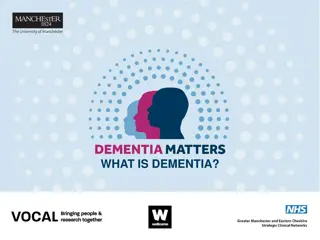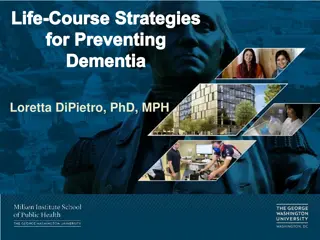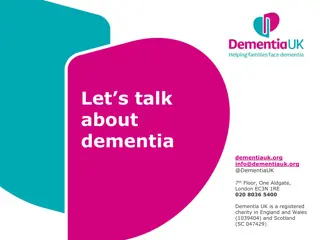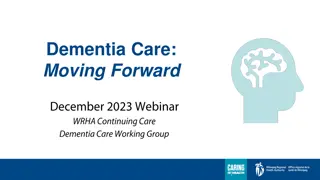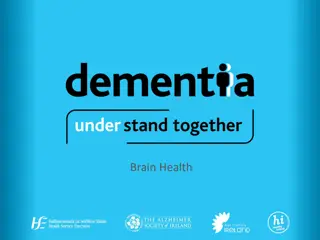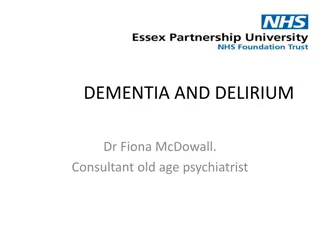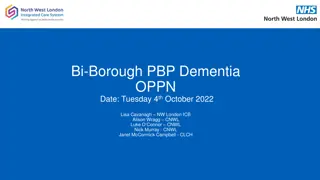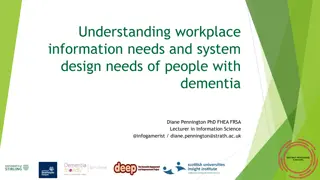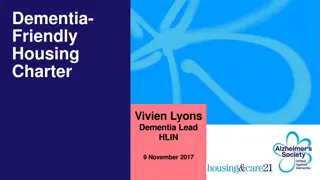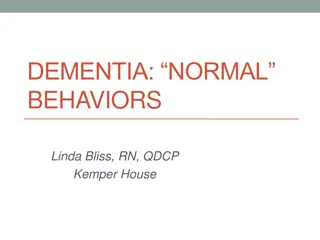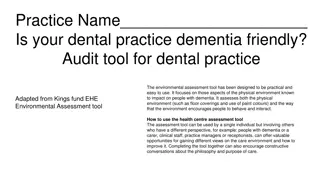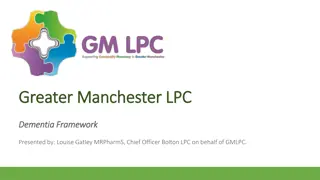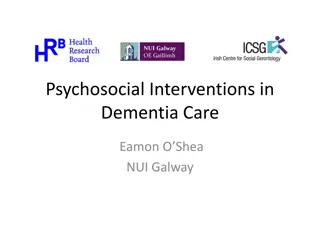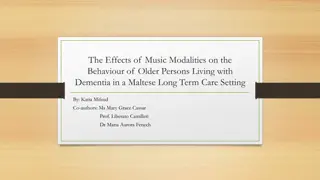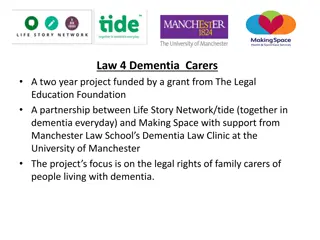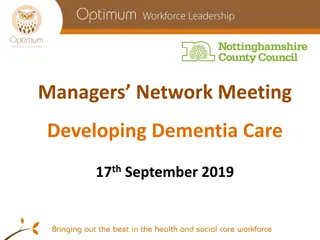Ways to Reduce Dementia Risk
Reduce your risk of dementia by following evidence-based actions such as protecting your hearing, seeking support for depression, avoiding brain injuries, staying socially active, and taking care of your heart. Other strategies include staying mentally and physically active, maintaining a healthy diet, getting quality sleep, managing stress, and staying socially engaged to lower the risk factors associated with dementia.
Download Presentation

Please find below an Image/Link to download the presentation.
The content on the website is provided AS IS for your information and personal use only. It may not be sold, licensed, or shared on other websites without obtaining consent from the author.If you encounter any issues during the download, it is possible that the publisher has removed the file from their server.
You are allowed to download the files provided on this website for personal or commercial use, subject to the condition that they are used lawfully. All files are the property of their respective owners.
The content on the website is provided AS IS for your information and personal use only. It may not be sold, licensed, or shared on other websites without obtaining consent from the author.
E N D
Presentation Transcript
10 ways to reduce your risk of dementia
While some risk factors for dementia cant be changed, there are many ways you can reduce your overall dementia risk.
Follow as many of these 10 evidence-based actions as you can to reduce your risk of developing dementia.
Protect and support your hearing Hearing loss in midlife can increase relative dementia risk by an average of 90%. But that risk is largely eliminated if you use a hearing aid to correct for that loss.
Seek support for depression Depression in later life can increase relative risk of dementia by an average of 90%. Depression is treatable! Seek help from a health-care provider.
Avoid concussion and traumatic brain injury Traumatic brain injury in midlife can increase relative risk of dementia by an average of 80% If you have had traumatic brain injury in the past, you can still reduce your dementia risk by taking action on the other fronts we've identified. Also try to avoid traumatic brain injury in future by paying attention to surroundings when walking, rolling or driving; avoiding risky activities; and playing safe.
Stay socially active Social isolation in later life can increase relative dementia risk by an average of 60%. Suggestions for older people from the National Institute on Aging in the US include: Playing cards or other games with friends in person or online. Travel with a group of older adults, such as a retiree group Video chat or call your friends and family members Try different restaurants with your loved ones. Join a group interested in a hobby such as knitting, hiking, birdwatching, painting or wood carving. Reconnect with old friends through your high school or college alumni association. Volunteer at a school, library, museum, hospital or animal shelter Visit a community or senior centre and take part in its activities
Protect your heart High blood pressure in midlife increases relative risk of dementia by an average of 60% If you have been prescribed antihypertensive medication, take it! Antihypertensive treatment for hypertension is the only known effective preventive medication for dementia. What's good for the heart is good for the brain! Monitor and manage your blood pressure and heart health
Quit smoking Smoking in later life can increase relative risk of dementia by 60% Stopping smoking, even in later life, ameliorates this risk Talk to your health-care provider
Manage your medical conditions Diabetes in later life can increase relative risk of dementia by an average of 50% Obesity in midlife can increase relative risk of dementia by an average of 60% Work with your health-care provider to manage these and other medical conditions or chronic conditions
Be physically active each day Physical inactivity in later life increases relative risk of dementia by an average of 40% Get moving however works for you. Walk, roll, jog, dance, swim, bike, garden or do chores or yard work. Any physical activity is better than none at all. If you need to start small, start small and grow from there.
Drink less alcohol In midlife, drinking more than 12 standard drinks a week in midlife increases relative dementia risk by an average of 20%. Try out the growing number of mocktail and alcohol-free drink options Team up with thousands of other people in Canada and do a Dry January and/or Dry February (dryfeb.ca) If you need help with limiting alcohol, speak with your health-care provider
Aim to get quality sleep Sleep is important to brain health A number of studies have also found that poor sleep can increase dementia risk Research is ongoing about the exact amount of dementia risk poor sleep brings We know that having better sleep can support your brain health at any age. Aim to get 6 to 8 hours a night Talk to your health-care provider if you are having difficulty with sleep
Thank you! For questions and comments, please email publications@alzheimer.ca alzheimer.ca @AlzheimerCanada @alzheimercanada Alzheimer Society of Canada @AlzCanada


